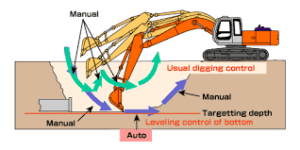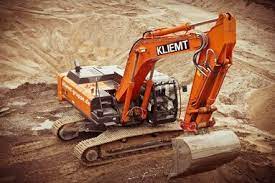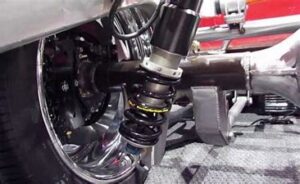Hydraulic excavators are giant equipment used for construction purposes, especially excavation ( as suggested by the name). It consists of a boom, dipper or stick, bucket, and a cab working on a rotating platform known by the name ‘house’. The house is fixed on the top of an undercarriage consisting of tracks or wheels. These are a succession that seems natural from the steam shovels and are often mistakenly known as power shovels.
The hydraulic fluid is responsible for all the movement and functions of a hydraulic excavator along with hydraulic cylinders and hydraulic motors. Because of the linear movement of hydraulic cylinders, the mode of operation associated with them is fundamentally different from the excavators which are cable operated and use winches and steel ropes for movement purposes.

Table of Contents
Components And Working Of Hydraulic Excavators:
The basic mechanism behind the working of a hydraulic excavator contains the undercarriage that consists of the tracks, track frame, blade, and the final drive. The final drive consists of a hydraulic motor and gears that are very useful in providing drive to the tracks. Other components, namely the operator’s cabin, engine, counterweights, hydraulic, and fuel tanks are all fixed to the undercarriage which enables the excavator to swing in a complete circle without anything stopping it.
The most important function of the excavator engine is to drive the hydraulic pumps that in turn provide oil at very high pressure to many components like the slew motor, rams, track motors, and several other accessories. The boom could move only up and down in most cases, or in addition to that, it can also shift towards the left and right of the machine. An arm is also fixed to the boom end that conveys the force for digging into the ground.
A bucket is fixed at the arm end which carries the soil. Moreover, there are several other categories of attachments with the hydraulic excavator that are used for many purposes such as boring, crushing, lifting, and even ripping.

Advantages Of Hydraulic Excavators:
- When passed the same amount of power, the hydraulic excavator device is comparatively smaller in size, compact in structure, and lighter in weight than the mechanical systems.
- The Hydraulic excavator is capable of realizing speed regulation without steps and a large speed range. At fast speeds, the inertia of hydraulic components is very small but the speed is high.
- Work done by hydraulic excavators is steady and reliable. A Set of a variety of safety valves, relief valves, etc. is present in the hydraulic system which is useful in the prevention of even occasional overloading or mishandling of the situation or the personal accidents including even any kind of damage to the machine.
- The working of hydraulic excavators is really simple and flexible as well.
- This hydraulic device can be made large. It can be configured with a number and variety of new devices, such as combination boom, telescopic boom mount, bottom-dump bucket, etc which are, at the same time, easy to replace.
- Maintenance and repair of hydraulic excavators is a very easy task. Just because a hydraulic excavator does not require complex mechanical systems, its structure has been simplified by removing half of the wearing parts which has largely simplified the maintenance as well as the repair work.
- The components in the hydraulic excavators are easy to get standardization, serialization, and generalization, and do the work of specialized products which thus improve the quality of the work and also decrease the expenses.
Disadvantages Of Hydraulic Excavators:
- Manufacturing of hydraulic components requires very high precision and the maintenance of components at an individual level is also a difficult task.
- The influence of outer conditions on the viscosity of the oil temperature is very large. Thus, doing any kind of work under high temperatures and low temperature affects the transmission efficiency largely. Moreover, the leaks of oil also affect the smooth action and transmission efficiency of the hydraulic excavators.
- Fuel consumption is high which means increased expenses, but it lasts for decades at the same time.
Applications Of Hydraulic Excavators:
Some important applications of hydraulic excavators are:
- Digging of trenches, holes, and foundations
- Handling things
- Brush cutting with the help of a hydraulic saw and mower attachments
- Work in forests
- Mulching in forests

- Construction purposes
- Demolition work with the help of a hydraulic claw, cutter, and the breaker attachments
- General grading as well as landscaping purposes
- Mining purposes
- Dredging of rivers
- Snow removal with the attachment of a snowplow and snowblower
1. How much is a hydraulic excavator?
2. Why hydraulic machines are used in excavators?
3. What is a JCB excavator?
4. What are hydraulics uses?
Conclusion:
After reading this article, it is now known to us that hydraulic excavators are used in a wide variety of applications. The most noticed application of this machine is excavation, as suggested by the name itself. Hydraulic excavators are also able of being used for the works including demolition, however, even the smallest models are more than just being able to demolish the buildings.
Hydraulic excavators are also widely used for moving large quantities of materials, usually heavy ones, such as minerals, from one place to another. Hydraulic excavators are often used along with some other types of equipment, such as bulldozers and loaders for construction works.
Hope this helps you!



